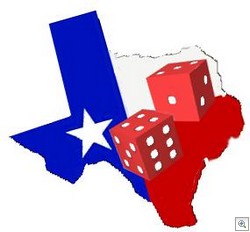 Texas has been the home to gamblers since its inception as a political entity. Whether the Texans were on the frontier in gambling saloons, in illegal Galveston or Dallas casinos, or off in Las Vegas (or in recent years Shreveport, Louisiana), they have loved the “action”. The attorney general of the state, Will Wilson, cracked down on illegal casinos in Galveston in 1957, prompting an effort to legalize the gambling. The efforts were aborted after local voters expressed a dislike for the casinos in advisory votes. Periodically there have been weak attempts to gain support for casinos, but these have all been unsuccessful. In the meantime, charitable gambling operations have been established in the state. Also, “gray” machines offering winners coupons for merchandise have existed openly in truck stops across the state, although their legality has been questioned.
Texas has been the home to gamblers since its inception as a political entity. Whether the Texans were on the frontier in gambling saloons, in illegal Galveston or Dallas casinos, or off in Las Vegas (or in recent years Shreveport, Louisiana), they have loved the “action”. The attorney general of the state, Will Wilson, cracked down on illegal casinos in Galveston in 1957, prompting an effort to legalize the gambling. The efforts were aborted after local voters expressed a dislike for the casinos in advisory votes. Periodically there have been weak attempts to gain support for casinos, but these have all been unsuccessful. In the meantime, charitable gambling operations have been established in the state. Also, “gray” machines offering winners coupons for merchandise have existed openly in truck stops across the state, although their legality has been questioned.
In 1992, the state launched a lottery, which quickly became one of the most successful in the United States, trailing only New York in sales for some years. The lottery offered instant games, lotto, and daily numbers games. Horse-track racing experienced ups and downs in attempts at legislation over seven decades, but finally in the 1990s licensing for tracks began. There are now eight tracks, the biggest being the Lone Star Park near Dallas-Fort Worth.
The state has only three Native American reservations. One – the Alabama Coushatta – is near Livingston, seventy miles north of Houston. The tribal members once voted against casinos, as they believe that outside gamblers would disturb their quality of life. They are also strongly religious. Another vote in 1999, however, indicated that they were destined to have a casino. Two other tribes, the Kickapoos in Eagle Pass and the Tiguas in El Paso, have started gambling operations with bingo games, card games, and machines. The state has refused to negotiate compacts with the two tribes, and legal controversies surround the gambling.
|
|